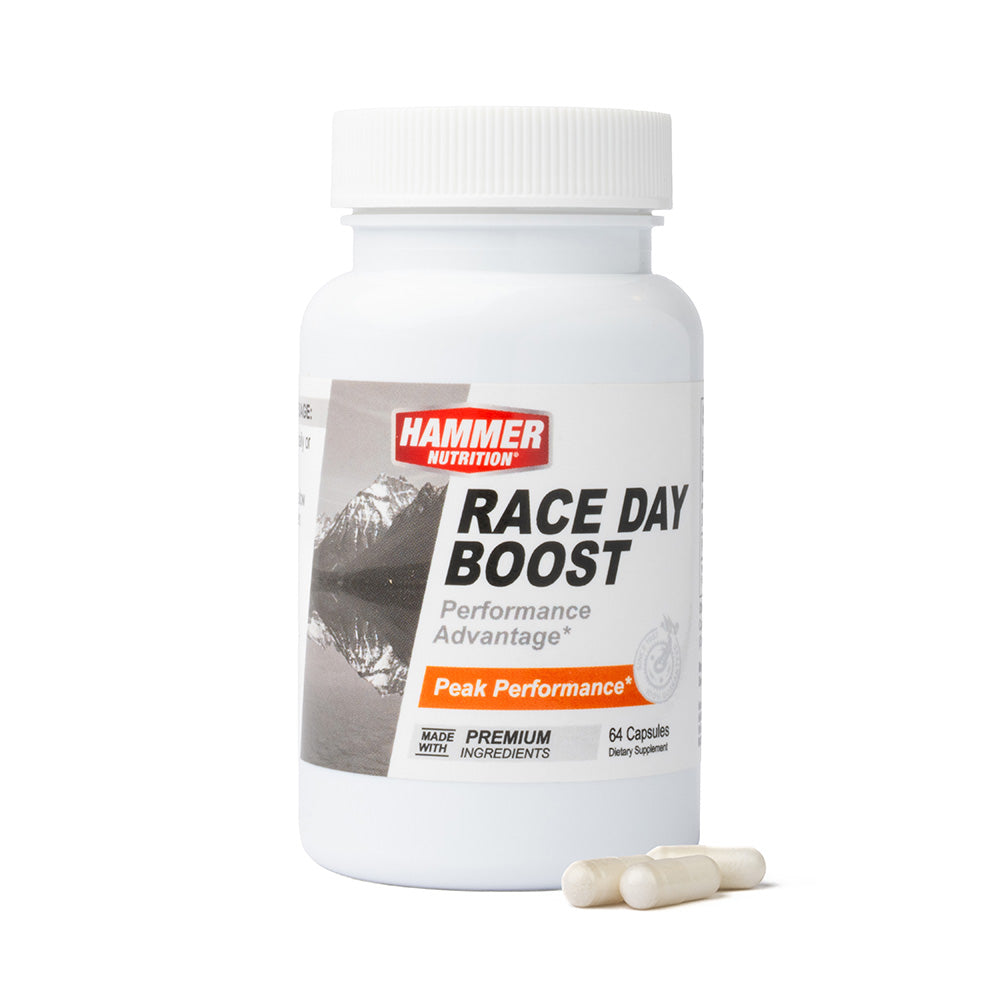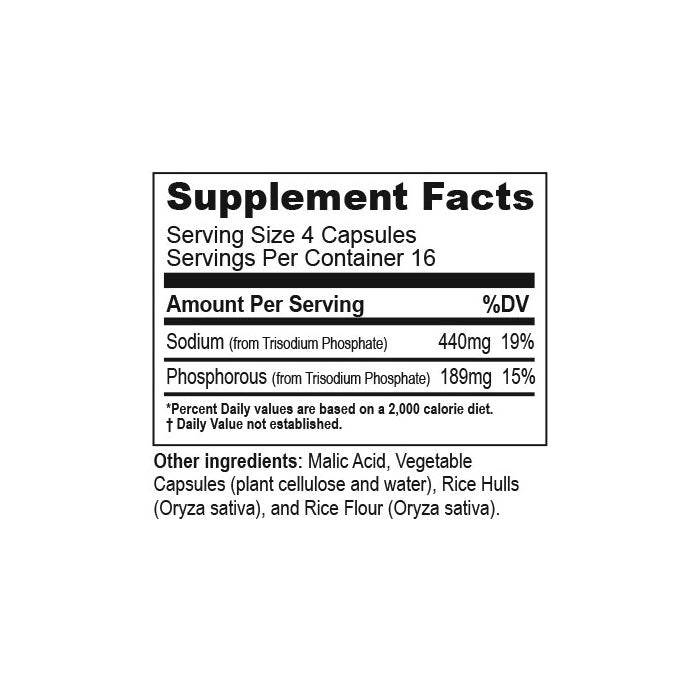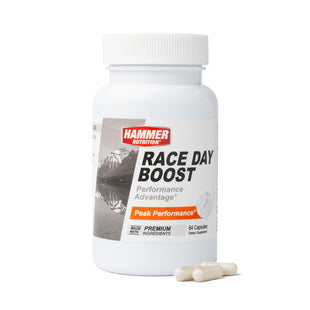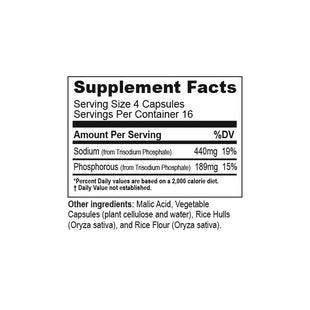




Race Day Boost
- Optimizes aerobic capacity
- Increases endurance
- Helps reduce unpleasant "burning sensation"
Race Day Boost is a vital part of the Race PR Kit
Quantity:





Race Day Boost greatly enhances the performance of your body’s three energy production pathways. That means, no matter what your race pace may be—low-to-moderate intensity, higher intensity/ anaerobic, or flat-out sprint—a four-day load with Race Day Boost delivers the goods to help you meet or exceed your race day expectations. Race Day Boost superbly buffers lactic acid and dramatically improves oxygen utilization, which is why it’s no surprise that, in the most extensive research to date on Race Day Boost’s primary ingredient, study subjects enjoyed a whopping 8% improvement in performance time.
- Is Sodium Phosphate, found in Race Day Boost and Perpetuem, safe to Consume?
- How much sodium is in a serving of Race Day Boost?
- Are your supplements 3rd party tested?
- I am looking for some insight into sodium bicarbonate (Baking Soda), as it seems that there is some strong scientific research that shows a reduction in lactate acid accumulation when taking this. What is Hammer's take on this?
Is Sodium Phosphate, found in Race Day Boost and Perpetuem, safe to Consume?
Yes, sodium tribasic phosphate (also referred to simply as sodium phosphate) is remarkably safe, especially in the relatively small amounts found in Race Day Boost and Perpetuem. Sodium phosphate enjoys FDA "GRAS" (Generally Recognized As Safe) status as an emulsifying agent, Nutrients and Dietary Supplement, a sequestrant (a food additive whose role is to improve the quality and stability of the food products), and for miscellaneous use.
The LD50 of orally dosed sodium tribasic phosphate for rats (the amount of an agent that is sufficient to kill 50 percent of the rats) is 7,400 mg/kg. Translated for a 75 kg/165 lb. athlete, that would mean a dose of nearly 555 grams (555,000 mg), an astronomically high amount that no one would even conceive of trying to take. By comparison:
- The LD50 of sodium bicarbonate (baking soda) for rats is 4,220 mg/kg
- The LD50 for rats consuming acetic acid (vinegar is a dilute aqueous solution of acetic acid) is 3,310 mg/kg
- The LD50 of sodium chloride (table salt) for rats is 3,000 mg/kg
More information can be found in the article "Alleviating Sodium Phosphate Concerns" in Endurance News #69, beginning on page 48.
How much sodium is in a serving of Race Day Boost?
Every four-capsule dose of Race Day Boost contains 1,000mg of trisodium phosphate, 440mg of which is comprised of sodium. The standard loading dose protocol is four servings a day for four days, so you'll be adding 1,760mg of sodium to your daily total. Over the course of four days that's an additional 7,040mg of sodium being consumed. The majority of athletes already consume far more sodium than is necessary from their diets, so it's extremely important to lower your dietary sodium/salt intake, especially when doing a loading dose of Race Day Boost.
Are your supplements 3rd party tested?
Yes, every Hammer Nutrition supplement is 3rd party tested in compliance with the FDA’s regulations, 21 CFR Part 111 – Dietary Supplements. All the raw materials for each supplement we produce are tested for purity, strength, identity, and integrity. In addition to raw material testing, every Hammer Nutrition supplement is also tested in every stage of production—blending, encapsulation / powder-filling, packaging components and finished goods—before being released for distribution.
I am looking for some insight into sodium bicarbonate (Baking Soda), as it seems that there is some strong scientific research that shows a reduction in lactate acid accumulation when taking this. What is Hammer's take on this?
Sodium bicarbonate has been shown, multiple times, to enhance exercise performance. However, the benefits appear to only apply to short-term, high-intensity exercise… it really has not been shown to enhance longer-duration bouts of exercise like sodium phosphate does. The biggest issue is the amount required in the loading dose, which is massively large. The general consensus of an effective dose is 0.3 to 0.4 grams per kilogram of body weight. A 165-lb. athlete is about 75 kilos, so the amount of sodium bicarbonate needed in a single dose is a whopping 22.5 to 30 grams of sodium bicarbonate to be consumed in the 60-90-minute period prior to exercise. This is an extremely high amount—more than high… massive!—so it’s no wonder that severe GI distress is common.
In fact, one study reviewed (https://www.ncbi.nlm.nih.gov/
We believe that sodium tribasic phosphate, which is what we use in Race Day Boost, is a much better acid-buffering/pH-neutralizing nutrient than sodium bicarbonate
Additionally, unlike sodium bicarbonate—whose applications are limited (only benefits short-duration, high-intensity bouts of exercise)—the sodium tribasic phosphate we use in Race Day Boost has more wide-ranging benefits. Sodium tribasic phosphate enhances functioning of all three of the body’s ATP-producing energy systems:
1) The ATP-CP (adenosine triphosphate and creatine phosphate) system
2) The lactic acid system
3) The oxygen/aerobic system
Race Day Boost boosts the performance of the body’s short-, medium-, and long-term energy production systems.
Studies on sodium phosphate date back to 1990 [Lenfant 1990, Lunne 1990], with Dr. Richard Kreider’s 1992 study arguably being the hallmark research on this substance. In Kreider’s study, subjects loaded with sodium phosphate for four days (1 gram four times daily). During a 40K time trial, mean power output increased by 17% and oxygen uptake by 17%, netting an 8% improvement in performance time! The amount of sodium phosphate used in Race Day Boost matches the dose used in all studies done with this nutrient.
Lastly, sodium tribasic phosphate actually has a lower potential for toxicity than does sodium bicarbonate (though both are EXTREMELY MINUTE to begin with). The LD50 of orally dosed sodium tribasic phosphate for rats (the amount of an agent that is sufficient to kill 50 percent of the rats) is 7,400 mg/kg. Translated for a 75 kg/165 lb. athlete, that would mean a dose of nearly 555 grams (555,000 mg), an astronomically high amount that no one would even conceive of trying to take. By comparison, the LD50 of sodium bicarbonate (baking soda) for rats is 4,220 mg/kg.
Use for major events.
One-Day Event—"A" Race
Take 4 capsules with food and water 4 times per day (16 capsules daily) for 4 days before a competition.
Multi-Day Event
Follow loading protocol for 3 days prior to start:
4 capsules, 4 times per day.
Then follow this twice-daily “maintenance dose” protocol after each stage:
Take 4 capsules with Recoverite® as soon as possible after racing each day, as well as another 4-capsule dose with food later in the day/evening.
PRO TIP
Do not use it for every race because this product has a “tolerance factor.” Therefore, use it ideally only four to six times per year.
Sodium (Tribasic) Phosphate – This compound enhances the functioning of all three of the body’s ATP-producing energy systems: the short-term ATP-CP system, the medium-term lactic acid system, and the long-term oxygen/aerobic system.
A primary benefit of sodium (tribasic) phosphate is its ability to buffer blood acidity and help maintain a more ideal acid-alkaline balance by neutralizing excess hydrogen ions within the muscle cell. Effectively buffering lactic acid extends energy production within this system. This nutrient also increases 2,3-diphosphoglycerate (2,3-DPG). This compound, found in red blood cells, helps release oxygen from hemoglobin into the muscle cells. An increase in 2,3-DPG will improve the availability of oxygen to working muscles during exercise.
Malic Acid – A natural substance found in apples and other fruits. Malic acid helps balance the extreme alkalinity of Race Day Boost, thus minimizing-to-eliminating the potential for stomach distress. As an essential component of the Krebs cycle, malic acid also helps boost energy levels and is beneficial for liver health.
|
Supplement Facts |
||
|---|---|---|
| Serving Size 4 capsules Servings Per Container 16 |
||
| Amount Per Serving | % Daily Value* | |
| Sodium (from Trisodium Phosphate) | 440mg | 19% |
| Phosphorus (from Trisodium Phosphate) | 189mg | 15% |
| * The Percent Daily Values are based on a 2,000 calorie diet. Your daily values may be higher or lower depending on your calorie needs. † Daily Value not established. |
||
| Other Ingredients: Malic Acid, Vegetable Capsule (plant cellulose and water), Rice Hulls (Oryza sativa), and Rice Flour (Oryza sativa). These statements have not been evaluated by the Food and Drug Administration. This product is not intended to diagnose, treat, cure or prevent any disease. |
||






